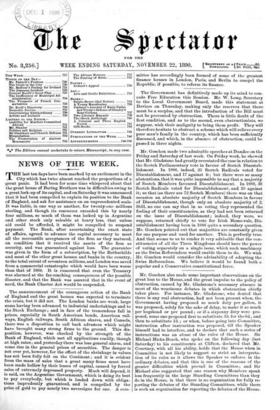Mr. Goschen also made some important observations on the great
loss to the House, and the great impulse to the policy of obstruction, caused by Mr. Gladstone's necessary absence in most of the wearisome debates in which obstruction chiefly takes place. For instance, Mr. Gladstone, who denied that there is any real obstruction, had not been present when, the Government having proposed so much duty per gallon, it was proposed, solely for the sake of delay, to make it so much per hogshead or per pound ; or if a sixpenny duty were pro- posed, some one proposed first to substitute 3d. for the 6d., and then to substitute ld. ; or when, before going into Committee, instruction after instruction was proposed, till the Speaker himself had to interfere, and to declare that such a series of instructions was an abuse of the rules of the House. Sir Michael Hicks-Beach, who spoke on the following day (last Saturday) to his constituents at Clifton, declared that Mr. Courtney, with all his ability, holds that the House when in Committee is not likely to support so strict an interpreta- tion of its rules as it allows the Speaker to enforce in the ordinary debates, and that this is one of the reasons of the greater difficulties which prevail in Committee ; and Sir Michael also suggested that one reason why Members speak less frequently in the large Standing Committees than they do in the House, is that there is no organisation for fully re- porting the debates of the Standing Committees, while there is such an organisation for reporting the debates of the House. If that be the reason for the greater obstructiveness shown in the debates of the House, we shall have to get the reporting for the House reduced (except for the leading speeches on both sides) to the minute scale of reporting observed for the debates in the Standing Committees.











































 Previous page
Previous page